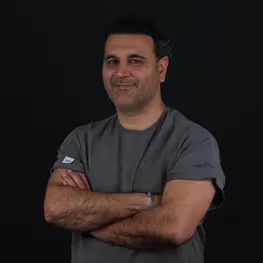A porcelain veneer in Turkey costs around £150–£300 per tooth, approximately $180–$370, whereas the same veneer costs £500–£1,000 in the UK and over $1,000 per tooth in the USA. Dental veneers in Turkey are significantly more affordable than in many Western countries, often costing up to 70% less. This dramatic price difference has made Turkey a popular destination for patients seeking a brilliant new smile without the exorbitant expense.
Despite the lower costs, clinics in Turkey offer high-quality veneers using the same top-grade materials and technology found in the UK or the US. Turkey offers an outstanding opportunity for those seeking to enhance their smile with veneers. You’ll benefit from world-class treatment, experienced dentists, and modern facilities – all at a cost that makes a dream smile attainable without breaking the bank. Whether you need a single tooth veneer or a full set, Turkey provides excellent value, high quality, and longevity.
By understanding the types of veneers, the costs involved, and how Turkey compares to other countries, you make an informed decision. The benefits of veneers in Turkey – from cost savings to top-notch care – are clear. With proper research and aftercare, your dental veneers in Turkey will result in a safe, successful, and long-lasting smile transformation. Take the next step toward your confident new smile by reaching out for a consultation. You may soon join the thousands of happy patients who have found their reason to smile brighter in Turkey.
TYPE OF VENEERS | £ | € | $ |
CELTRA DUO® LAMINATE VENEER | £300 | € 350 | $420 |
CELTRA DUO® CROWN / FULL VENEER | £300 | € 350 | $420 |
PORCELAIN CROWN / FULL VENEER | £100 | € 115 | $140 |
ZIRCONIUM CROWN / FULL VENEER | £185 | € 215 | $260 |
DIO IMPLANTS + TITANIUM ABUTMENT | £350 | € 400 | $490 |
E.MAX© CROWN / FULL VENEER | £240 | € 280 | $330 |
E.MAX© LAMINATE VENEER | £240 | € 270 | $340 |
INLAY/ONLAY CERAMIC | £220 | € 255 | $310 |
INLAY/ONLAY ZIRCONIUM | £220 | € 250 | $310 |
Dental veneer treatment is not an expensive treatment in today's conditions. Prices for all dental treatments may vary regionally. For example, prices for veneers in Antalya are much more economical and affordable than in Istanbul and other metropolitan cities. Even in Antalya, there may be differences in prices. There are some important elements in determining dental veneer prices. The quality of the material used in the treatment, the experience of the physician, the equipment of the dental clinic where the treatment is performed, and the structure of the patient's mouth are also factors in the variability of prices. Antalya is one of the cities where the best dental clinics and dentists are located in Turkey in this sense. You can contact any Antalya dental clinic and get a price for Antalya veneer treatment. It is very difficult to give a clear price without consulting with your doctor and a preliminary examination. In addition, dental clinics in Turkey are prohibited by law from specifying prices on their websites. When calculating Antalya veneers cost, do not think about the cost of the days you will spend in this magnificent city.

What Are The Costs And Types Of Veneers Available in Turkey?
When getting veneers in Turkey, patients have access to all the major types of veneer materials, each with its own advantages and price range. Whether you seek the ultimate in lifelike appearance or an economical way to enhance your smile, Turkish clinics offer a solution. Here are the common tooth veneer types and their costs in Turkey.
- Porcelain Veneers: Porcelain veneers are among the most popular veneer types worldwide. These thin ceramic shells closely mimic natural tooth enamel, offering a strong, stain-resistant, and long-lasting solution, often lasting 10–15 years with proper care. In Turkey, porcelain veneers cost between £125–£300 per tooth, making them significantly more affordable than in the UK or the US. Patients choose porcelain veneers in Turkey for their natural look, durability, and ability to improve tooth colour, shape, and alignment effectively.
- Zirconium Veneers: Zirconium veneers, known as zirconia veneers, are made from a strong ceramic material called zirconium oxide. Known for their exceptional durability and fracture resistance, they’re ideal for patients who grind their teeth or need veneers on back teeth. Modern zirconium offers improved translucency for a natural appearance. In Turkey, zirconium veneers in Turkey cost approximately £180–£250 per tooth, similar to porcelain. They combine strength and aesthetics, making them a reliable choice for a long-lasting, attractive smile.
- E-max Veneers: E-max veneers are made from high-strength lithium disilicate porcelain and are known for their superb aesthetics and durability. They offer a natural translucency that closely resembles real enamel, making them a top choice for smile makeovers. In Turkey, E-max veneers in Turkey cost around £200–£240 per tooth, offering excellent value compared to prices over $1,000 in the US. Ideal for front teeth, E-max veneers are perfect for correcting severe discolouration or enamel defects with a premium, lifelike result.
- Composite Veneers: Composite veneers are made from a tooth-colored resin material applied directly to the teeth and hardened with light. They are the most affordable veneer option in Turkey, typically costing £80–£120 per tooth. While not as translucent as porcelain, they create a natural looking, polished smile. The treatment is usually completed in a single visit, making it ideal for travellers. Composite veneers last around 5–7 years, are more prone to staining, but are minimally invasive, reversible, and perfect for a fast, cost-effective smile enhancement.
In addition to the above, Turkey’s cosmetic dentists offer specialised veneer options. Lumineers are available for patients who qualify. Lumineers in Turkey require little to no tooth shaving and cost roughly £200–£400 per tooth in Turkey, notably less than in the US, where Lumineers are $800–$2,000 each. There are removable clip-on veneers, which are much cheaper; however, most patients travelling to Turkey opt for permanent solutions.
No matter the type you choose, veneer prices in Turkey are highly competitive. For example, even the top-tier E-max or porcelain veneers in Turkey might cost £200 each, versus £700–£1000 in the UK. This cost advantage means patients afford a full set of veneers in Turkey for the price of just a few veneers at home.

How Much İs A Full Set Of Veneers in Turkey?
A full set of veneers in Turkey typically costs between £3,000 and £5,000 for 16–20 porcelain veneers, depending on the clinic and materials used. Some clinics, like Myra Dental Centre, offer package deals from £4,000 for 20 veneers, averaging just £200 per tooth. This is significantly more affordable than in the UK, where prices range from £15,000 to £20,000, or in the USA, where costs exceed $20,000. Even smaller sets of 8 to 10 veneers in Turkey often cost just £1,500 to £2,500.
A “full set of veneers” usually refers to veneering all visible teeth when smiling. Some patients opt to veneer only the upper front teeth, while others include both arches for a complete smile transformation. The exact number of veneers depends on your smile line, tooth visibility, and aesthetic goals. Your dentist will evaluate your facial features and recommend the ideal number to ensure a balanced, natural result.
Turkey’s clinics specialise in full-mouth cosmetic cases, often offered as smile makeover packages. Treatment is typically completed in just 5–7 days, and many clinics include hotel accommodation, airport transfers, and local transportation for international patients. This makes it easy to combine your dental treatment with a relaxing holiday.
Dentists in Turkey use Digital Smile Design to plan your smile according to facial proportions, bite alignment, and gum health. The result is not just a brighter smile, but one that looks and functions naturally.
In short, getting a full set of veneers in Turkey means premium results at a fraction of the cost, with added comfort, speed, and service.
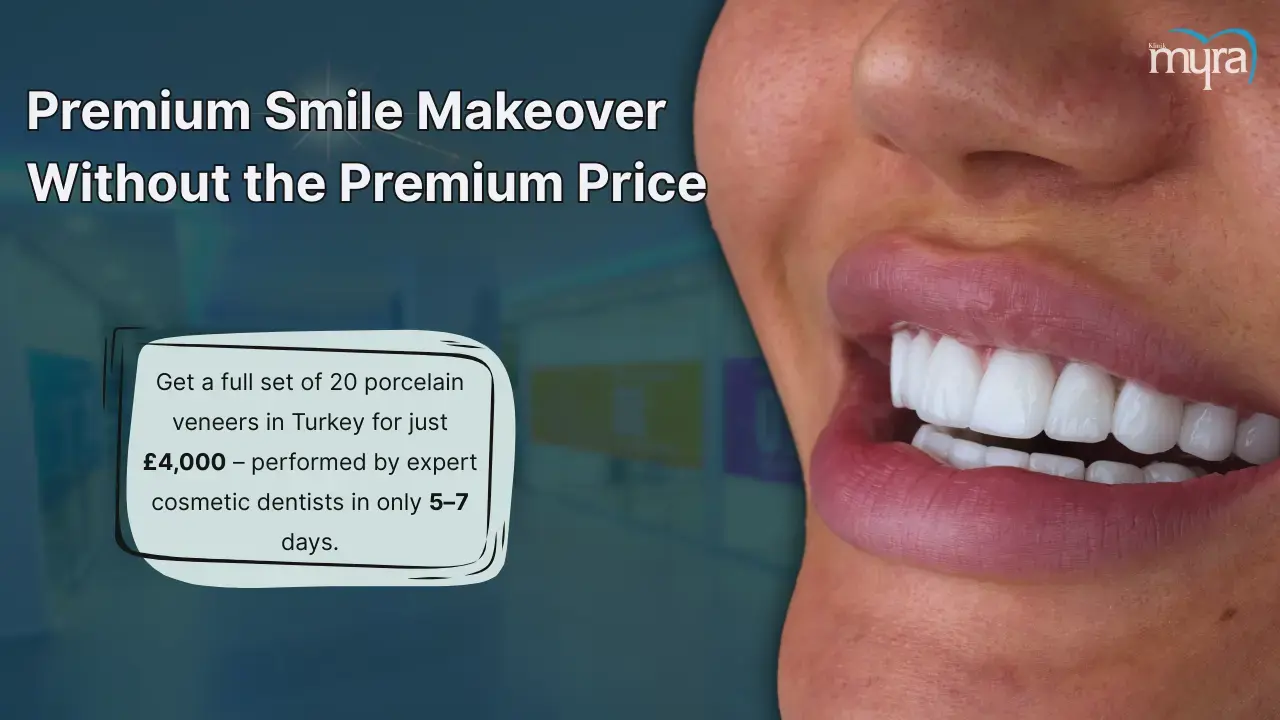
What is the typical number of veneers needed in Turkey for Smile Design?
One of the most common questions when planning a smile makeover is: “How many veneers do I need?” The answer depends on your case, smile goals, and which teeth are visible when you smile. There is no one-size-fits-all number. Some people might only need 1 or 2 veneers to cover a couple of flawed teeth, while others may opt for 6, 8, or even 20 veneers for a full smile transformation.
Dentists often focus on the “smile zone”, meaning the upper front teeth that show when you grin. For many patients, veneering the upper six front teeth create a dramatically improved smile. Others choose 8 upper veneers, which cover a broader smile line. If the lower teeth show significantly when talking or smiling, patients might veneer some of the lower front teeth for a cohesive look. A typical cosmetic case might use 6–10 veneers on the top and possibly 6–10 on the bottom.
Ultimately, the typical number of veneers needed is determined by factors like the extent of discolouration or damage, the symmetry you want to achieve, and your budget. If your goal is a full Hollywood smile, you may lean toward 8–10 upper veneers and corresponding lower veneers if needed to ensure uniform colour and shape across your smile. If you have one discoloured tooth or a couple of chipped teeth, you might only do 1–4 veneers targeting those issues. Dentists in Turkey will evaluate your smile line, tooth alignment, and the width of your grin to suggest an optimal plan.
It’s worth noting that the more veneers you get, the higher the total cost, but the incremental cost per tooth in Turkey is low enough that many patients choose to do a few extra teeth to perfect their smile. Since a single veneer in Turkey might be only £150–£200, adding two more veneers to cover an adjacent tooth is relatively cost-effective for a better overall result. Dentists will consider your bite if front teeth are being veneered; they may recommend doing the canines or premolars as well to ensure a balanced bite and consistent appearance.
In practice, most smile makeovers use 6–10 veneers on average for the upper arch. This tends to address all the visible front teeth. If a “full set” including lower teeth is desired, the total might double. During your initial consultation, the dentist will tell you exactly how many veneers you should have to meet your expectations. They will base this on a careful analysis of your smile design dynamics. Conversely, if you have generalised discolouration, doing a larger set ensures every tooth that shows is uniformly bright.
How many veneers are needed in Turkey is the same question as anywhere: it depends on your unique needs. The typical range is anywhere from 1 veneers up to 20 veneers, with 6–10 being very common for a standard smile makeover. Your Turkish dentist will guide you to the right number. The key benefit in Turkey is that, whatever that number is, the cost will be much lower than elsewhere, allowing you to achieve your dream smile more affordably.
What Are The Benefits Of Getting A Full Set Of Veneers in Turkey?
Choosing to get a full set of veneers in Turkey comes with a host of benefits that extend beyond just the attractive pricing. Turkey has established itself as a world leader in dental tourism, and for good reason. Here are some of the major benefits of veneers in Turkey below, when you commit to a complete smile makeover.
- Significant Cost Savings: Veneers in Turkey cost only 20–30% of UK or US prices. A full set that costs £10,000–£20,000 in the UK or $20,000 in the US can be done in Turkey for a fraction of the price, even after travel expenses.
- Advanced Technology: Clinics are equipped with cutting-edge tools like digital smile design, CAD/CAM systems, and 3D imaging. Turkish dentists are internationally trained and follow strict clinical and hygiene standards.
- Experienced Cosmetic Dentists: Turkish dentists perform veneer procedures daily and have extensive experience with international patients. They offer expert advice on the best shape and colour for natural, aesthetic results.
- All-Inclusive, Fast Service: Treatment is typically completed in 5–7 days. Clinics offer full packages that include airport transfers, hotel stays, and personal coordinators, ensuring a smooth, hassle-free process.
- Minimally Invasive Procedure: Veneers require minimal enamel removal and no surgery. Treatment is quick and nearly painless, with immediate recovery and low risk—ideal for international patients.
- Confidence-Boosting Results: Veneers provide a complete smile makeover, correcting stains, gaps, and wear. The transformation leads to greater confidence in social and professional life.
- Holiday Experience: Patients often combine treatment with a vacation. Turkey offers beautiful destinations like Antalya and Istanbul, turning your dental visit into a relaxing and enjoyable trip.
Getting a full set of veneers in Turkey offers tremendous benefits: you save a lot of money, receive high-quality and advanced treatment from expert dentists, enjoy a streamlined and pampering process, and achieve the smile of your dreams and get them all in one trip. It’s no surprise that patients from the UK, Europe, the Middle East, and even the US are flocking to Turkey for veneers. By choosing wisely selecting a reputable clinic, you expect excellent results. The next part will outline the general benefits of veneers themselves, which apply wherever you get them, and Turkey’s offerings maximise those advantages by making veneers accessible and efficient. 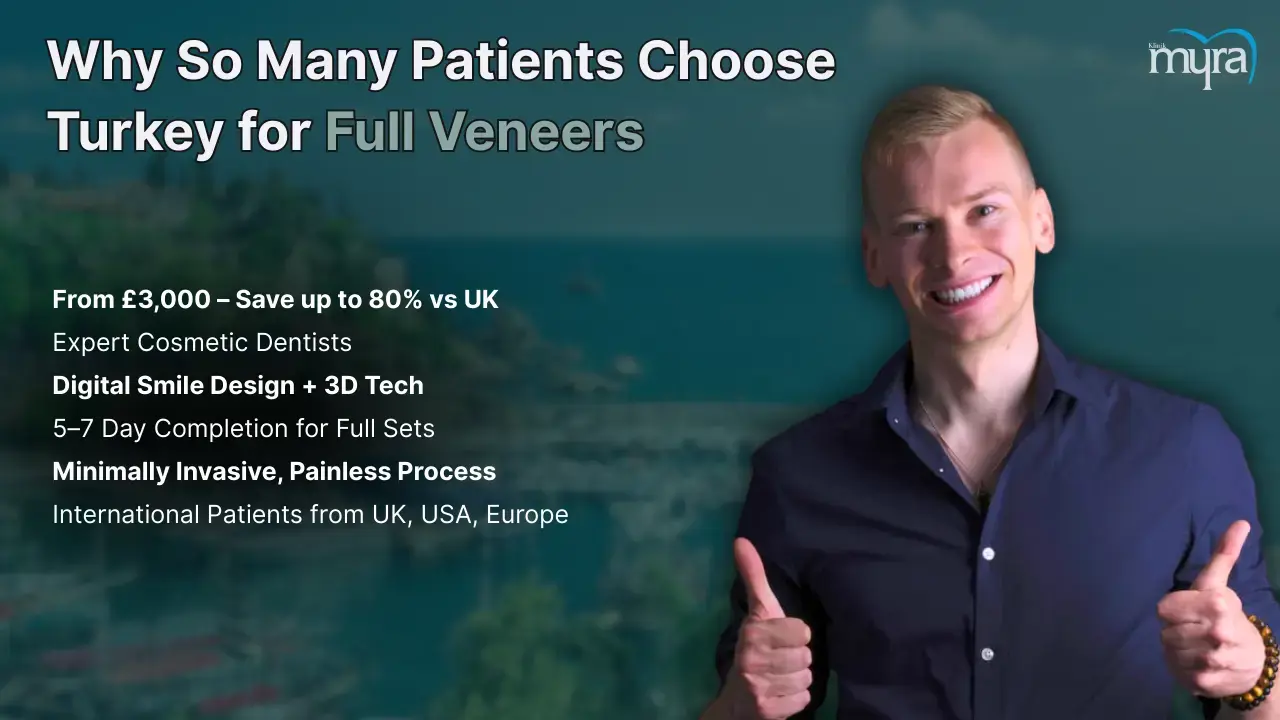
What are the common benefits of veneers?
Dental veneers are one of the most popular cosmetic dentistry treatments worldwide because they offer a host of benefits for your smile and dental health. Whether you get veneers in Turkey or elsewhere, the fundamental advantages are the same. Here are the common benefits of veneers that make them such a sought-after solution.
- Instant Aesthetic Improvement: Veneers correct stains, chips, gaps, and uneven teeth, creating a brighter, more symmetrical smile. Even a few veneers dramatically improve appearance, making you look younger and more confident.
- Minimal Tooth Reduction: Only a thin layer of enamel is removed, preserving most of the natural tooth. No-prep options are available for some patients, making the procedure less invasive and usually pain-free.
- Stain Resistance: Porcelain veneers resist staining from coffee, wine, and tobacco, staying white for years. Composite veneers stain more easily but modern materials offer improved resistance.
- Long-Lasting Results: Porcelain veneers last 10–15 years or more with proper care, while composite veneers last around 5–7 years. Both types are durable and require only standard dental hygiene to maintain.
- Custom and Natural Look: Veneers are tailored in shape, size, and shade to match your facial features and smile goals. High-quality porcelain mimics the light-reflecting properties of natural enamel for a realistic appearance.
- Confidence Boost: Veneers restore your ability to smile freely, enhancing social and professional interactions. Patients often feel more outgoing and comfortable in their daily lives after treatment.
- Fast and Comfortable: Veneers offer a quick smile transformation, typically completed in days. The procedure involves minimal discomfort and no significant downtime, making it ideal for those seeking immediate results.
These benefits explain why veneers have become a cornerstone of cosmetic dentistry. They offer an ideal balance of conservative treatment and remarkable aesthetic enhancement, all in a relatively short time. By getting your veneers in an experienced setting like Turkey, you ensure you reap all these benefits of veneers at an outstanding value. With proper care, your veneered smile will remain beautiful, strong, and confidence-boosting for many years to come.
Decoding Dental Veneer Costs: Factors Behind Their Pricing
It’s clear that veneers vary widely in price from country to country and even between dental clinics. To understand veneer cost and especially to appreciate why veneers cost in Turkey is so much lower, one should consider the various factors that go into the pricing of veneers. Here we decode the dental veneer costs by breaking down the key components that influence the final price of treatment.
- Number of Veneers: The more veneers you need, the higher the total cost. Clinics charge per tooth, but Turkey’s low per-veneer pricing keeps even full sets affordable. Some clinics offer discounted package deals for larger cases.
- Material Type: Porcelain veneers cost more than composite due to the material and lab work. Premium types like E-max or Lumineers are priced higher than standard porcelain. In Turkey, high-quality materials are still available at lower prices.
- Dentist Expertise: Highly experienced or internationally recognised dentists may charge more. In Turkey, even top cosmetic dentists are more affordable than their UK or US counterparts, offering great value for expert care.
- Clinic Location: Clinics in countries with lower overhead, like Turkey, offer veneers at reduced prices. Cities like Antalya benefit from lower rents and intense competition, which helps keep pricing competitive.
- Lab and Technical Fees: Veneers are handcrafted in labs, and lab fees vary based on quality and location. Turkish labs are skilled and cost-effective, allowing clinics to provide top-quality veneers at a lower cost.
- Technology Used: Advanced tools like digital scanners or same-day milling machines may raise treatment cost slightly but improve results and speed. Most clinics in Turkey are well-equipped with modern technology.
- Additional Treatments: If you need fillings, gum contouring, or whitening before veneers, these will add to the total cost. However, these treatments are more budget-friendly in Turkey.
- Aftercare & Warranty: Some clinics include warranties and check-ups in their pricing. While this may raise the upfront cost slightly, it provides peace of mind. Always check what’s included in your quote.
Understanding these factors helps explain why veneer costs vary and why Turkey manages to keep costs low. In Turkey’s case, the low cost of living, low clinic overhead, competitive market, and government support for medical tourism all contribute to cheaper veneers in Turkey. The quality of materials, tech, and expertise remains high which is the ideal scenario for patients. By decoding the price, you ensure you’re comparing apples to apples when looking at quotes. For instance, if one quote includes 8 veneers and gum contouring with a high-end cosmetic dentist, and another is just for 8 veneers with a general dentist, the cheaper one may not be the better value in the long run. Always consider the whole package.
In conclusion, veneers cost in Turkey is low due to favorable economic factors and efficient practices, but veneer pricing in general is determined by the number of teeth, materials, dentist skill, location, technology, additional procedures, and aftercare included. Turkey hits the sweet spot of offering excellent materials and dentists with low operating costs, which is why patients get top-tier veneers there for much less. By decoding the cost factors of veneers, you should make informed decisions and budget effectively for your new smile.
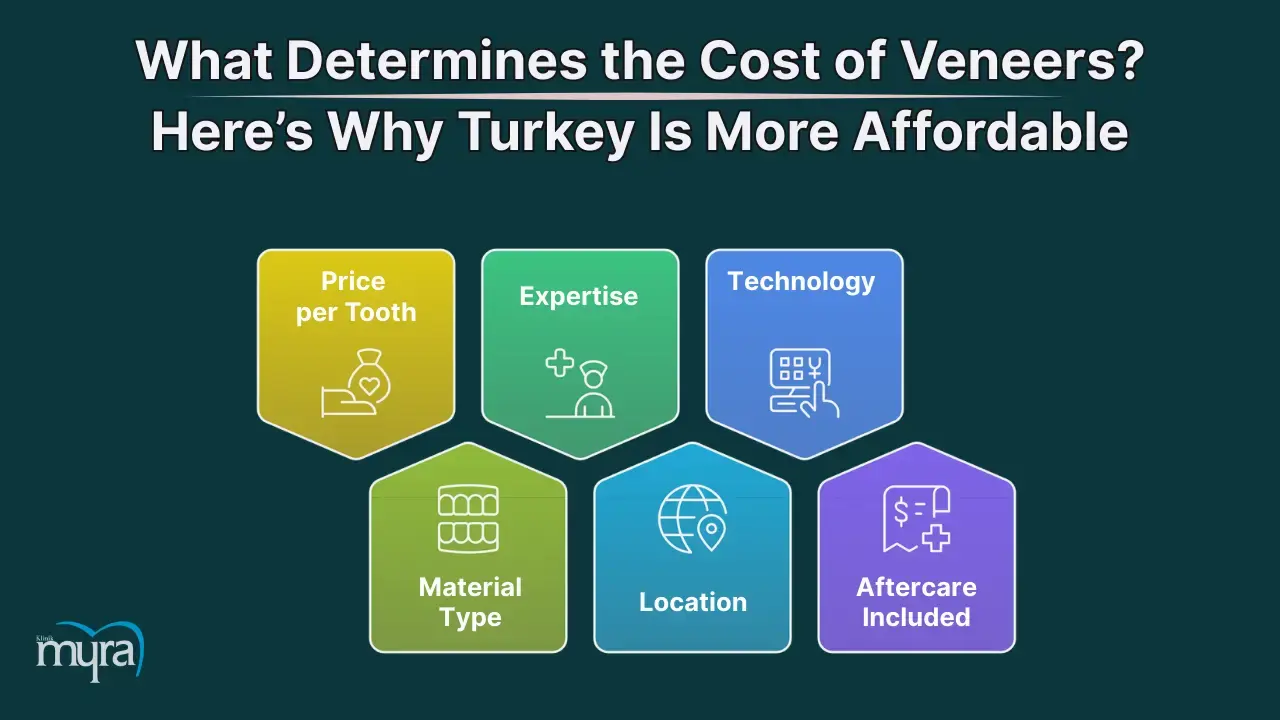
UK Veneers Cost: Price Considerations And Comparisons
For patients in the United Kingdom, the cost of veneers has traditionally been quite high, leading many to explore options abroad. Tooth veneers in UK private clinics range widely in price depending on the material and location. On average, porcelain veneers in the UK cost about £500–£1,000 per tooth. In high-end London practices, prices tend to skew toward the upper end of that range (or even more). Composite veneers in the UK are less expensive, roughly £150–£400 per tooth, since the material is cheaper and the process is quicker. These figures reflect the difference in material quality: porcelain, being more durable and lifelike, commands a premium, whereas composite is more affordable but may not last as long.
There are several price considerations in the UK context.
- Regional Price Differences: Veneers in London and other major UK cities are often 20–30% more expensive than in smaller towns. A single porcelain veneer may cost over £1,000 at top-tier clinics like Harley Street, while smaller clinics may offer similar treatments for a few hundred pounds less.
- Private Cost, No NHS Support: Veneers are considered cosmetic and are not covered by the NHS, except in rare medical cases. This means UK patients pay out of pocket, often using financing options to manage the high upfront cost.
- Quality vs Cost: UK dentists emphasise longevity—porcelain veneers often last 15–20 years, which spreads the cost over time. However, the initial investment is high, pushing many patients to explore cost-effective alternatives abroad.
- Turkey vs UK Prices: On average, porcelain veneers in the UK cost around £600 per tooth, while the same veneer in Turkey is just £200. A full set of 8 veneers might cost £5,000 in the UK compared to £1,600 in Turkey, even after adding travel expenses, thousands of pounds in savings.
- Extra Hidden Costs: UK treatments may involve additional charges for consultations, cleaning, or aftercare products. In Turkey, many of these services are included in treatment packages, offering better value.
All in all, veneer costs in the UK are high, with porcelain veneers commonly in the half-thousand to one thousand pounds range per tooth. Patients are paying for skilled UK cosmetic dentists, quality materials, and the convenience of local treatment, but not everyone finds the cost feasible. This has led to many Brits seeking treatment abroad for a better deal.
It’s important to weigh the pros and cons: while staying in the UK means easier access to your dentist if any issue arises, the financial burden is heavy. On the other hand, Turkey offers the same veneers for much less, though it requires travel. Each patient must consider their priorities but purely on cost, Turkey has a clear advantage over UK prices for veneers. 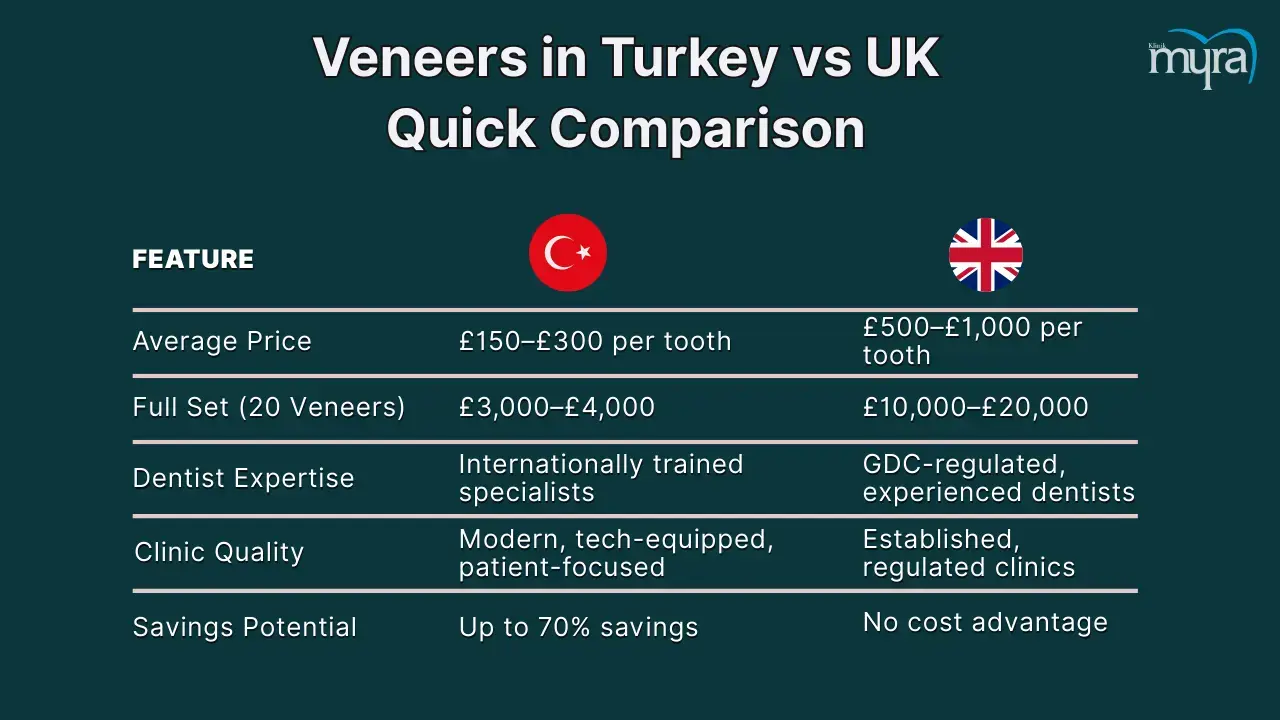
Veneers in UK vs Turkey: Prices, Pros and Cons
Comparing veneers in Turkey vs the UK, several factors come into play.
- Cost differences
- Quality of care
- Convenience
- Overall experience
Cost Comparison: As discussed, the cost of veneers in the UK is roughly 3-4 times higher than in Turkey on a per-tooth basis. For example, if a porcelain veneer is £700 in the UK and £200 in Turkey, that gap multiplied by multiple teeth results in enormous savings. A full set of veneers that might cost £10,000 in the UK could be around £2,500 in Turkey, even adding a £500 flight and hotel, the difference is huge. Turkey’s lower pricing is due to lower operating costs and a favourable exchange rate, not lower quality. Many of the same global brands of materials are used by Turkish labs. Patients save 50-70% by choosing Turkey, which is the primary reason Turkey is so attractive.
Quality and Expertise: Both the UK and Turkey have excellent, qualified dentists. In the UK, you have the assurance of the General Dental Council (GDC) regulating practitioners and a high standard of training. Turkey’s top clinics likewise boast highly trained dentists, many of whom have international experience and accreditations.
Turkey has invested heavily in its dental tourism sector, resulting in modern clinics with cutting-edge technology that meet or exceed UK standards. In terms of quality of veneers, Turkish dental labs produce work on par with UK labs. İn fact, some UK dentists outsource work to Turkey or other countries to save on lab costs. That said, the UK has a very mature dental industry with strict oversight, which gives some patients peace of mind.
The key is to choose a reputable Turkish clinic (many of which are well-reviewed by international bodies). When done at a reputable clinic, veneers in Turkey are just as good in quality as veneers in the UK, as countless patient testimonials have to confirm.
Many patients conclude that the pros of Turkey outweigh the cons, especially if they choose a top clinic. They accept the travel inconvenience in exchange for saving thousands and still getting a fantastic result. Others who are very risk-averse or unable to travel might stick with the UK’s convenience and oversight, despite the cost.
Beyond pricing, other factors such as the quality of materials, clinic standards, and dentist expertise play a crucial role in decision-making. Therefore, patients should carefully evaluate all aspects before choosing their treatment destination for veneers in UK vs Turkey. This underscores the importance of choosing a reputable clinic in Turkey. When you do, the consensus is that veneers in Turkey are just as good as those in the UK, and the dramatic cost savings make it an extremely compelling option.
Veneers in USA Vs Turkey: Prices, Pros And Cons
Patients from the United States are increasingly exploring Turkey for veneers, given the steep costs of cosmetic dentistry in the USA. Let’s compare veneers in the USA vs Turkey in terms of price, advantages, and drawbacks.
Price Difference: The cost gap is even more pronounced here than the UK. In the USA, a single porcelain veneer ranges from about $1,000 to $2,500, depending on the location and dentist. Big cities like New York, Los Angeles, or Miami tend to be on the higher end. A full set of 20 veneers in the US easily runs $15,000 to $30,000. By contrast, in Turkey, the same veneer might cost $180–$300. So you might be looking at, say, $4,000 for a full set in Turkey vs $20,000 in the US. Even after adding the cost of international flights and accommodation, Turkey comes out far ahead financially. Turkey offers veneers at roughly 1/4 or less of the US price for comparable quality. This is mainly due to the higher overhead and labour costs in the U.S., as well as the market rates that established cosmetic dentists command there.
Quality of Care: The United States is known for its advanced healthcare and dentistry. American cosmetic dentists often have cutting-edge technology and extensive training; the top ones treat Hollywood stars. However, Turkey’s elite clinics are not far behind in terms of technology and skill. Many Turkish dentists stay updated with the latest American and European techniques. The process of getting veneers is essentially the same in both countries and Turkey’s dentists follow the same protocols. One difference might be that in the US, cosmetic dentistry is a big business with many specialists, whereas in Turkey, the dentists might be more well-rounded. But larger Turkish clinics do have specialised cosmetic dentists too. In terms of materials, labs, and outcomes, Turkey achieves results on par with the US. The key is picking a reputable clinic; the best Turkish clinics treat many American patients who testify that the quality is as good as back home.
Overall, for Americans, choosing Turkey ultimately depends on whether you prioritize cost savings and a unique travel experience over the convenience of staying local. If budget is a major consideration, Turkey is the clear winner. The quality of top clinics in Turkey rival those in the U.S., making it a logical option for many. Increasing numbers of Americans are joining the growing wave of “dental tourism” to Turkey—something Europeans have been doing for years. As long as patients carefully weigh the pros and cons, they make an informed decision about getting veneers in the U.S. or Turkey. 
Veneers in India Vs Turkey: Price Comparisons And Pros & Cons
Turkey isn’t the only country known for affordable dentistry; India is another popular destination for veneers and other dental work. Both countries offer low-cost, high-quality treatment to international patients, but there are differences.
Cost Comparison: Both India and Turkey offer veneers at a fraction of Western prices, but India is even slightly cheaper in some cases. Porcelain veneers in India might be priced as low as $120–$250 per tooth. This means a full set of 10 could be perhaps $1,500, and an extremely low figure by global standards. Turkey’s veneer costs, as we know, average around $180–$370 per tooth. So, on pure price, India may have an edge for the lowest cost. One source notes both countries offer 80–90% less than Western countries for veneers, which underscores how affordable both are. Essentially, for cost, India ≈ and Turkey in affordability, with India sometimes quoted a bit lower. However, the difference in actual dollar amounts may not be huge when we’re already talking only a couple of hundred per tooth in either place.
Quality of Treatment: India has a robust healthcare system with many well-trained dentists. India produces a large number of English-speaking doctors and dentists every year. Many Indian dental clinics that cater to tourists have internationally trained staff and high standards. They often highlight using the same materials and following similar sterilisation protocols as the US/UK. Turkey’s clinics are generally extremely modern, and the country has positioned itself as more of a luxury dental tourism spot compared to India. Indian clinics can vary; some are state-of-the-art, especially in big cities like Mumbai, Delhi, or Bangalore, while some smaller ones might be more basic. Overall, both countries deliver excellent veneer results. India often markets “rock-bottom prices” as a selling point, whereas Turkey emphasises a mix of quality and a pleasant travel experience.
In essence, both India and Turkey provide excellent value for veneers. Many patients end up choosing based on secondary factors: If you’re in Europe or US, Turkey is far more convenient. If you’re in Asia or the Middle East, India might be closer. If you want the absolute lowest cost, perhaps lean India. If you want slightly more “premium” feel, maybe Turkey. Some patients even consider combining destinations.
Your new smile are going to be superb whether you choose veneers in Turkey or India. Ultimately, it comes down to your personal priorities. Both countries have earned international recognition and boast thousands of satisfied veneer patients from abroad.

Veneers in Mexico Vs Turkey: Prices And Considerations
Mexico is another well-known destination for affordable dental work, especially for Americans and Canadians, due to its proximity. Turkey and Mexico are sometimes compared as they both attract dental tourists. Let’s examine veneers in Mexico vs Turkey below.
Cost Comparison: Mexico offers veneers at lower prices than the US/Canada, though generally a bit higher than Turkey’s prices. The average cost of a veneer in Mexico ranges from about $300 to $1,000 USD per tooth, depending on the material and clinic. This means that at the lowest end you might find $250-$300 each, whereas high-end porcelain by a cosmetic specialist in a place like Cancun or Tijuana might approach $800-$1000 each.
Turkey’s average of $180–$370 per tooth is slightly more affordable and consistent. Essentially, Turkey’s typical prices hover in the low hundreds of dollars, whereas Mexico’s can climb into the mid hundreds. However, both are significantly cheaper than the US.
A full set of veneers in Mexico may cost around $6,000 to $10,000. This price depends on the clinic. It is about half of the price in the US. In Turkey, the cost might be $3,000 to $6,000.
Some Mexican border towns, like Los Algodones, are known for lower prices. This place is often called “Molar City.” Competition there has helped lower costs, and good deals are found. Overall, Turkey and Mexico are similar in affordability. However, Turkey is usually a bit cheaper on average.
Quality and Clinics: Mexico has a broad range of dental clinics. Some cater almost exclusively to American tourists, with American-trained dentists and modern facilities. Others are local clinics that may not have English-speaking staff or the latest tech. The top Mexican clinics in places like Cancun, Mexico City, Guadalajara, or Los Algodones are quite advanced and experienced with veneers.
Many US patients go to Mexico for cosmetic dentistry and are very satisfied. Turkey’s clinics, especially those for tourists, are uniformly high-tech and luxurious in the main cities. One difference is scale: Turkey’s dental tourism infrastructure is often in large, internationally marketed clinics, whereas Mexico has many small practice owners offering their services. Both countries have excellent. Material-wise, both use the same global brands for veneers.
Mexico vs Turkey for veneers often comes down to geography. Americans find Mexico extremely convenient and cost-effective; Europeans find Turkey the same. Both countries deliver great results at a fraction of first-world prices. For an American willing to consider both, Turkey might save a bit more money, but Mexico is far closer. For a Brit, Turkey is clearly the more practical choice among the two.
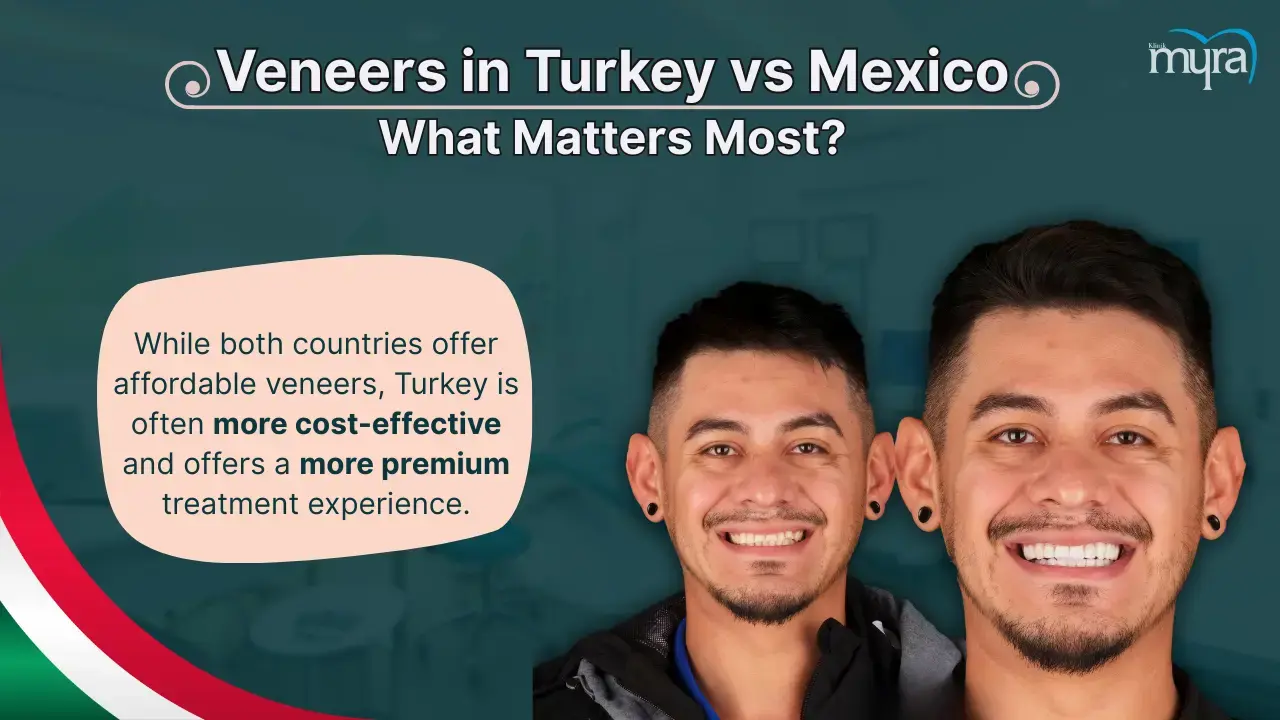
What Are Dental Veneers in Turkey?
In Turkey, veneers are performed to the same high standards as in any modern dental practice worldwide. The country’s top clinics use advanced techniques like digital smile design and 3D imaging to plan veneer cases with precision. Patients expect the same materials that they would get in the UK or USA. The big difference is cost: due to Turkey’s lower lab and clinic overhead, dental veneers cost in Turkey is only a fraction of the price one would pay in Western Europe or North America. This means you receive expert veneers in Turkey while enjoying substantial savings. Many international patients save 50–70% on veneers by getting them in Turkey. They do not lose quality or safety. That combination of quality and affordability defines why Turkey has become a leading destination for veneer treatments.
Dental veneers are ultra-thin, custom-made shells bonded to the front surface of teeth to improve their appearance. Dental veneers are a popular cosmetic dentistry solution used to correct stained, chipped, gapped, or misaligned teeth, instantly creating a whiter and more symmetrical smile. Veneers are typically made from either porcelain or composite resin. Porcelain veneers are renowned for their lifelike translucency and durability – once bonded, they replicate the natural look of teeth and resist staining from coffee, tea, or smoking. Composite veneers are made of a tooth-colored resin; they are generally crafted directly onto the teeth and are a more affordable, though slightly less durable, option. In both cases, the veneer is carefully shaped and colour-matched to surrounding teeth for a seamless result.
Placing veneers usually involves minimal tooth preparation. The dentist will remove a very thin layer of enamel, about 0.5 mm or less, to make room for the veneer, ensuring it sits flush and looks natural. An impression is then taken and sent to a lab where the veneer is fabricated, or for composite veneers, the dentist layers the resin directly onto the tooth in a single visit. Once ready, the veneer is bonded to the tooth with a strong dental cement and cured (hardened), creating a permanent attachment. The procedure is generally painless and quick, often completed in 2–3 appointments or even a single day for composites.
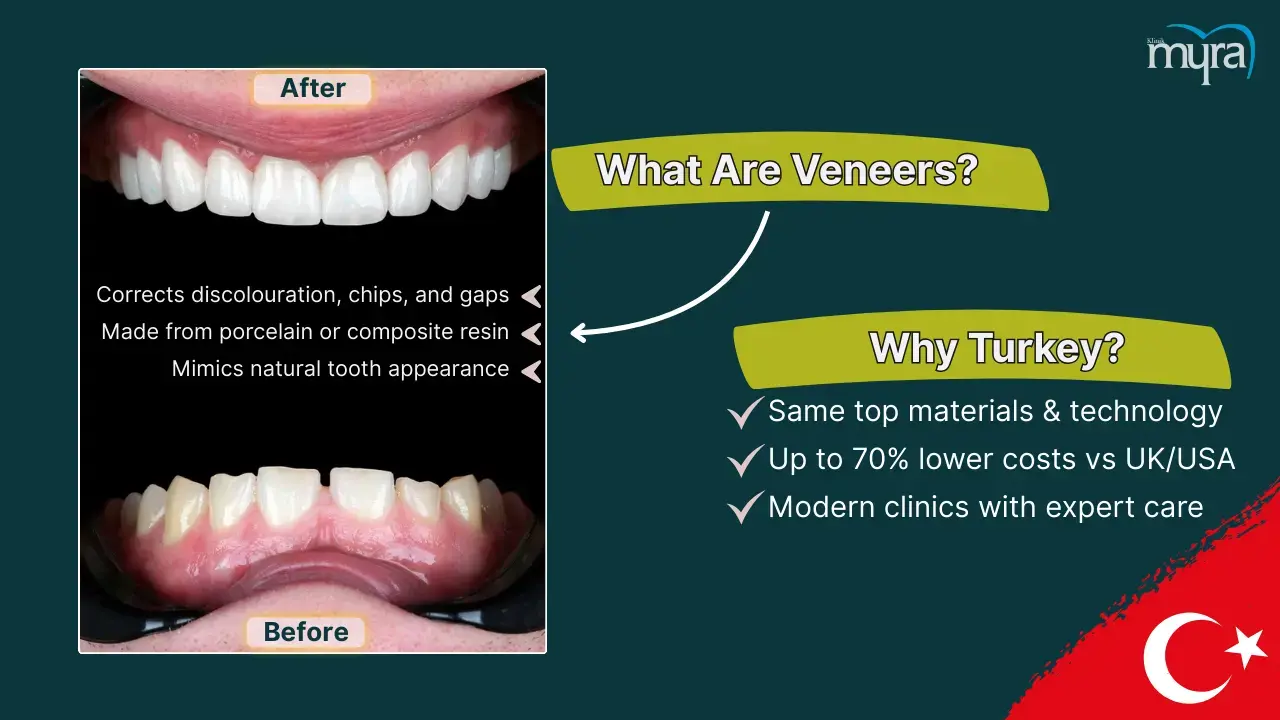
Is It Safe To Get Veneers in Turkey?
Yes, the good news is that getting veneers in Turkey is generally very safe, provided you choose a reputable clinic. Safety is a paramount concern for anyone considering dental treatment abroad. Turkey’s dental industry is well-developed, and the country actively encourages medical tourism, meaning there are regulations and high standards in place at accredited clinics. Here we’ll address safety aspects and how to ensure you get the best veneers in Turkey without issues.
- Quality of Clinics and Dentists: Top Turkish dental clinics are equipped to Western standards of hygiene and care. They use modern sterilisation protocols, and many are certified by international bodies. Dentists in Turkey go through rigorous training and many have additional specialisation in cosmetic dentistry.
- Common Risks of Veneers: Veneers as a procedure carry some standard risks, regardless of the country. These include: slight tooth sensitivity after preparation, gum irritation, or the veneer potentially debonding if not properly cared for or in rare cases of poor bonding. These are not specific to Turkey; they are inherent to veneers. Ensuring you follow aftercare advice will keep your veneers safe long-term.
- Ensuring a Safe Experience: To make sure your veneer treatment in Turkey is safe, due diligence in selecting the clinic is key. Additionally, clinics offering the “best veneers in Turkey” likely use top-tier labs and materials, which contributes to a safer, better outcome.
- Regulatory Oversight: Turkey has organisations like the Turkish Dental Association, which all dentists must be part of. Clinics that consistently underperform or create safety issues would not last long, as word spreads quickly in the internet age.
In conclusion, it is safe to get veneers in Turkey as long as you do what you would do in your home country: go to qualified professionals. The materials and techniques used are the same worldwide. Turkey’s dentists have extensive experience with veneers, and the clinics are built to welcome international patients with comfort and safety in mind. By doing a bit of homework to find the right provider, you confidently travel to Turkey and come back with a beautiful, securely attached new smile. Thousands of people each year safely achieve their dream smiles in Turkey – you are going to be one of them.

How Long Do Veneers From Turkey Last?
Veneers from Turkey last just as long as veneers from any other country, because their lifespan depends on the material and how well you care for them, rather than where they were made. Patients not only want a great price and appearance, they want to know that their new veneers will stand the test of time. Generally, you expect a well-crafted porcelain veneer to last between 10 and 15 years on average before it may need.
Many veneers even last 20 years or more if the patient maintains excellent oral hygiene and avoids undue stress on them. Composite veneers have a shorter lifespan, usually around 5 to 7 years, since the resin material is not as strong or colour-stable as porcelain.
- Porcelain Veneers Lifespan: Porcelain is a very durable material – it’s glass-like but once bonded to the tooth, it becomes incredibly sturdy. Studies and clinical experience show that about 90-95% of porcelain veneers last 10 years without problems, and around 80-85% will last 15-20 years. Essentially, porcelain veneers often last a decade or longer. Many patients still have beautiful veneers even after 15-20 years. Over time, tiny wear or marginal staining occur, or the gumline might recede slightly, which could eventually warrant replacing the veneer. But with proper care, you should expect well over a decade of service from porcelain veneers done in Turkey. The materials Turkish dentists use (e.g., E-max, Empress, or zirconium-based porcelains) are top-grade, so there is no difference in potential longevity compared to veneers made in the UK or USA.
- Composite Veneers Lifespan: If you opted for composite veneers (maybe for a quick fix or budget reasons), be aware they typically last around 5 years before they may need a refresh. Composites are more prone to staining, chipping, or losing their polish over time. The good news is they often be repaired or repolished in the dentist’s office, potentially extending their life a bit. But in general, if you want a long-term solution, porcelain is the better choice. Many patients who start with composite eventually upgrade to porcelain later. Turkish clinics do either, but they often recommend porcelain for durability, especially for patients travelling long distances (so you don’t have to come back soon for replacements).
Maintenance for Veneers Longevity
How long your veneers last from Turkey or anywhere, heavily depends on how you care for them.
- Practice meticulous oral hygiene: brush twice daily with a non-abrasive fluoride toothpaste, and floss daily. Decay still happens on the uncovered parts of teeth or around veneers, which could compromise them. Good hygiene prevents cavities and gum disease that could shorten veneer lifespan.
- Avoid using your veneered teeth as tools: Don’t bite fingernails, pen caps, or open packages with your teeth. While veneers are strong, they aren’t indestructible to certain forces.
- Wear a night guard if you grind or clench: Bruxism puts extreme pressure on veneers (and natural teeth). If you have this habit (many people do at night), a custom night guard is a wise investment to protect your new smile. Mention this to your Turkish dentist – they actually make you a night guard to take home, often for a low cost.
- Mind hard foods: You eat normally with veneers, but very hard foods (like cracking nuts with your teeth, chewing ice, very hard candies) should be avoided. Biting into an apple or corn on the cob is fine with porcelain veneers, but try to cut extremely hard things into pieces.
- Avoid excessive staining agents (for composites): Porcelain veneers resist stains, but composite veneers will discolour if you’re frequently drinking black coffee, red wine, curries, etc. Using a straw for staining liquids and rinsing after consuming staining foods help.
- Regular dental check-ups: Continue to see your local dentist every 6 months. They will check your veneers, clean around them, and ensure your gums stay healthy. They will polish the veneers if needed. Even though you got the work done abroad, maintenance at home is straightforward.
You expect long-lasting results from your Turkish veneers. Porcelain veneers from Turkey last on average a decade or longer, then 15+ years with good care, which is the same lifespan you’d get anywhere else in the world. Composite veneers last around 5-7 years before likely needing replacement or significant touch-up. The key determinants of veneer longevity are the material chosen and how well the patient maintains their oral health and habits.
Turkey’s high-quality materials and skilled technicians ensure that you aren’t compromising lifespan by going there, you’re simply saving money. So, you confidently invest in a new smile in Turkey knowing it will be durable and serve you well for many years of beautiful smiles.
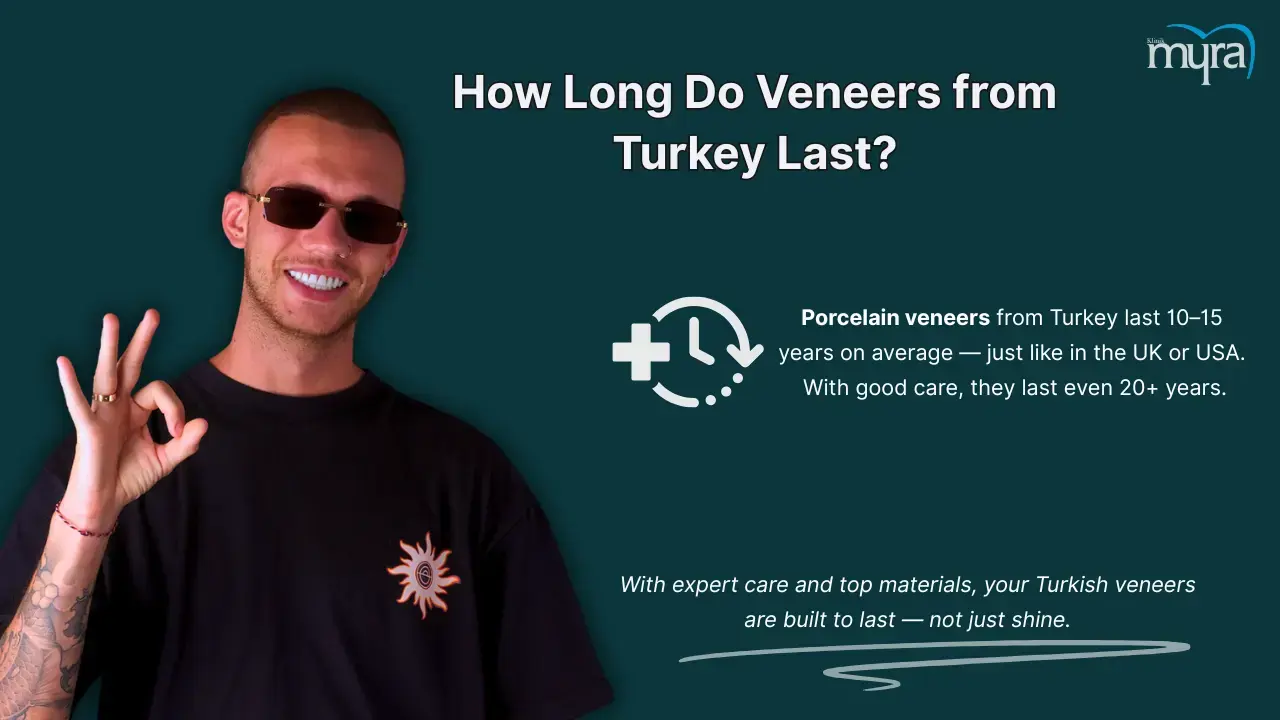
Myra Dental Centre: Real Patient Before & After Photos and Affordable Veneer Prices
Discover how effective and affordable veneer treatment is at Myra Dental Centre. To see the stunning transformations for yourself, visit our before&after photos page, where we showcase real patient cases from correcting discolouration to closing gaps and enhancing symmetry. These visuals reflect the power of expert cosmetic dentistry and the life-changing results it can deliver.
For a transparent overview of our costs, be sure to check out our detailed dental treatments prices in Turkey page. You'll find pricing for porcelain, zirconium, and E-max veneers, with porcelain veneers starting at just £150 per tooth. We offer full-set veneer packages ranging from £3,000 to £5,000, making your dream smile both attainable and affordable.
